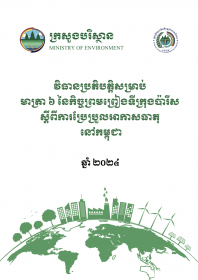Policy Timeline

July 03
1951UNESCO
July 03, 1951Cambodia joined the United Nations Educational, Scientific and Cultural Organization (UNESCO).
September 20
1964Institute of Technology of Cambodia (ITC) in Cambodia is established
September 20, 1964A Cambodian Higher Education Institution which was founded in 1964 and supported by cooperation between the Cambodia and the former Soviet Union.
February 09
1995Submission letter of accession to the UN-CBD
February 09, 1995March 17
1996Cambodia ratification of UNFCCC enter into force
March 17, 1996UNFCCC was adopted at the United Nations Headquarters, New York on the 9 May 1992. Currently, there are 197 Parties (196 States and 1 regional economic integration organization), including Cambodia, to the United Nations Framework Convention on Climate Change. The convention objective is to stabilize greenhouse gas concentrations in the atmosphere at a level that will prevent dangerous human interference with the climate system, in a time frame which allows ecosystems to adapt naturally and enables sustainable development.
Cambodia is not emitted country but highly vulnerable to climate change. The country is voluntary with globe to combat climate change with principle 'common but differentiated responsibilities'.
January 01
2002National Biodiversity Strategy and Action Plan (NBSAP)
January 01, 2002June 23
2003Created Climate Change Office within MoE
June 23, 2003The only office established within Ministry of Environment responsible for all activities related to climate change.
December 16
2003Cartagena Protocol on Biosafety ratification enter into force
December 16, 2003Cartagena protocol is an international agreement which aims to ensure the safe handling, transport and use of living modified organisms (LMOs) resulting from modern biotechnology that may have adverse effects on biological diversity, taking also into account risks to human health. It was adopted on 29 January 2000 and entered into force on 11 September 2003.
April 24
2006National Committee on Climate Change is established
April 24, 2006"An inter-ministerial mechanism, and is cross-sectoral and multi-disciplinary in nature. 19 ministries agencies are member.
It is established to prepare, coordinate and monitor the implementation of policies, strategies, legal instruments, plans and programmes of the Royal Government to address climate change issues."
January 01
2008Creation of Department of Biodiversity and International Conventions within MoE
January 01, 2008January 01
2012National Council on Green Growth (NCGG) and its General Secretariat
January 01, 2012January 01
2012Cambodia submitted 1st National Communication to UNFCCC
January 01, 2012January 01
2013Accession letter on Nagoya-Kuala Lumpur Supplementary Protocol on Liability and Redress to the Cartagena Protocol on Biosafety
January 01, 2013February 22
2013Agreement on the Establishment of the Global green Growth institute (GGGI)
February 22, 2013The main benefits of joining the GGGI is to move Cambodia towards a greener economy which focuses on effectively applying natural resources, green jobs, green tech, green finance, green credit, and green investment.
March 01
2013National Green Growth Policy and Strategic Plan (2013-2030)
March 01, 2013"The policy and strategic plan are to promote a national economy with growth stability, reduction and prevention of environmental pollution, safe ecosystem, poverty reduction, and promotion of public health service, educational quality, natural resources management, and sustainable land use and water resources management to increase energy efficiency, ensuring food safety and glorify the national culture"
October 01
2013Cambodia Climate Change Strategic Plan 2014-2023
October 01, 2013The first national strategic plan designed to ensure its strategic cohesion to address a wide range of climate change issues concerning adaptation, GHG mitigation, and low-carbon development.
January 01
2014National Science and Technology Council
January 01, 2014The General Secretariat of the National Science and Technology Council of Ministry of Planning was established to coordinating and promoting 1) research and development, 2) education, training, science and technology, and 3) science and technology services.
October 07
2014The launch of the National Science and Technology Master Plan 2014-2020
October 07, 2014"The Master Plan is aimed for the industrial innovation through the securing of Science and Technology foundation. Furthermore, three core industries have been selected for the investigation and analysis – including agriculture, primary industries, and ICT.
It was launched by Ministry of Planning with support from the Korea International Cooperation Agency (KOICA)."
January 19
2015Ratification of Nagoya Protocol
January 19, 2015Ratification of Nagoya Protocol on Access to Genetic Resources and the Fair and Equitable Sharing of Benefits Arising from their Utilization to the Convention on Biological Diversity. "The Nagoya Protocol on ABS was adopted on 29 October 2010 in Nagoya, Japan and entered into force on 12 October 2014, 90 days after the deposit of the fiftieth instrument of ratification. Its objective is the fair and equitable sharing of benefits arising from the utilization of genetic resources, thereby contributing to the conservation and sustainable use of biodiversity. The Nagoya Protocol will create greater legal certainty and transparency for both providers and users of genetic resources by:
· Establishing more predictable conditions for access to genetic resources.
· Helping to ensure benefit-sharing when genetic resources leave the country providing the genetic resources
By helping to ensure benefit-sharing, the Nagoya Protocol creates incentives to conserve and sustainably use genetic resources, and therefore enhances the contribution of biodiversity to development and human well-being."
February 16
2015Cambodia ratification of Kyoto Protocol enter into force
February 16, 2015The Kyoto Protocol was adopted in Kyoto, Japan, on 11 December 1997 and entered into force on 16 February 2005.
During the first commitment period of 2008-2012, Cambodia approved 10 CDM projects in the field of renewable energy and energy efficiency resulting in reduction of approximately 2 million tons of carbon dioxide per year.
May 19
2015National Council for Sustainable Development is established
May 19, 2015"A major institutional reform to promote sustainable development and to ensure economic, environmental, social and cultural balance of the nation.
It is consolidated from 4 bodies: National Council of Green Growth and its Secretariat, the National Climate Change Committee and its Secretariat, the National Biosafety Secretariat and the National Biodiversity Steering Committee"
September 30
2015Cambodia submitted Nationally Determined Contributions (NDC) to UNFCCC
September 30, 2015Cambodia recognizes the need for respecting the principles of the UNFCCC. The NDC set out the actions planned to reduce Greenhouse gas emissions, and adapt to climate change, and how the plans will be financed and tracked for Cambodia.
November 17
2015Submitted the Instrument of Acceptance of the Doha Amendment to the Kyoto Protocol
November 17, 2015The Instrument of Acceptance would allow Cambodia to further participate in implementing projects under the Clean Development Mechanism (CDM) of the Kyoto Protocol for the period of 2012-2020 (the second commitment period). This acceptance also shows Cambodia’s commitment to join global efforts in reducing greenhouse gas emission in order to achieve the 2 degree limit.
January 01
2016Cambodia submitted 2nd National Communication to UNFCCC
January 01, 2016February 01
2016NBSAP update
February 01, 2016March 08
2017Paris Agreement on Climate Change ratification enter into force for Cambodia
March 08, 2017"The historical agreement in combating climate change.
From this ratification, Cambodia is expected to receive financial support, technological transfer, and capacity building which immediate response to climate change and disaster risk."
May 25
2020First Biennial Update Report of the Kingdom of Cambodia to the United Nations Framework Convention on Climate Change
May 25, 2020In line with the UNFCCC requirements, Cambodia submitted two National Communications, the first in 2002 and the second in 2016. Further, Cambodia voluntarily submitted a national forest reference emissions level to the UNFCCC in 2017. The National Council for Sustainable Development/the Ministry of Environment of the Kingdom of Cambodia is now pleased to present the first Biennial Update Report (BUR) to the UNFCCC and requests for relevant stakeholders to use this as a reference for preparing policies and strategies to address climate change in the country.
The report includes relevant data and information regarding Cambodia's major sources of GHG emissions and sinks, coupled with necessary mitigation measures already implemented or planned; thus, furthering her contribution to global efforts to reducing GHG emissions. The report is also developed in accordance with the UNFCCC BUR Guidelines. It has been integrated inputs and comments from a series of consultative meetings and workshops both at technical and management level with key line Ministries, Development Partners, Research Institutes and Academia, and relevant stakeholders. We thank all relevant stakeholders for their kind contribution to this report, particularly, the United Nations Environment Programme for the overall support and quality insurance.
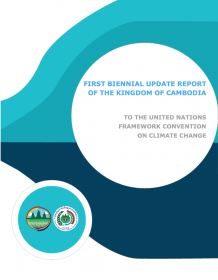
December 31
2020Cambodia's Updated Nationally Determined Contribution (the Updated NDC)
December 31, 2020The updated Nationally Determined Contribution (NDC) for Cambodia presents our commitments and needs for the next decade, in order to realize our vision of a low carbon and resilient society. Developed through extensive consultations over a nine-month period, our NDC includes contributions from all concerned stakeholders in the country, including relevant ministries and agencies, civil society representatives, development partners, academia, and the private sector.
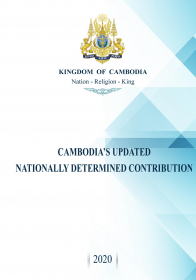
December 31
2021Long-Term Strategy for Carbon Neutrality
December 31, 2021This LTS4CN essentially aims to serve as a roadmap or vision document based on a comprehensive analysis and modelling of all relevant economic sectors, and it looks several decades ahead. It outlines priority mitigation actions for each sector to achieve the country’s goal of a carbon neutral economy in 2050. The strategy largely builds on existing commitments of the Royal Government and proposes a trajectory consistent with the Updated Nationally Determined Contribution. It takes into consideration the balance between emissions reductions, economic growth, social justice, and climate resilience. Economic analysis shows that the investments to be made under this strategy have the potential to create 449,000 additional jobs, and deliver an additional 2.8% of annual GDP growth by 2050 for Cambodia. We can achieve carbon neutrality by 2050 through continued efforts to address the forest sustainability and land use; decarbonize our power sector and pursue higher energy efficiency; as well as promote low-carbon agriculture, industrial processes, and waste management.
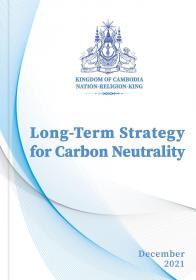
September 15
2022Cambodia's Third National Communication
September 15, 2022This Third National Communication presents country's development status, needs, and updated analysis of climate change adaptation and mitigation challenges, an updated inventory as well as an overview of measures taken for climate change actions.
The TNC comes at a crucial time for global climate change action. Recent global trends in
greenhouse gas emissions are still below the level of effort required to achieve the objectives of the Paris Agreement on Climate Change. Financial commitments to developing countries are also behind target. At a time when unforeseen economic and geopolitical shocks create competing priorities, it is essential to maintain a strong global commitment to the climate change agenda, which is inseparable from long-term sustainable development.
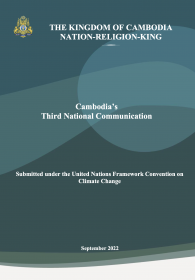
June 29
2023Royal Code on Environment and Natural Resource
June 29, 2023ក្រមនេះកំណត់អំពីវិធានទាំងឡាយដែលត្រូវគោរពនិងប្រតិបត្ដិតាមក្នុងការពង្រឹង ធ្វើទំនើបកម្ម ធ្វើឱ្យមានសង្គតិភាព និងធ្វើឱ្យប្រសើរឡើងនូវការគ្រប់គ្រងលើកិច្ចគាំពារបរិស្ថាន ការអភិរក្ស និងស្ដារឡើងវិញនូវធនធានធម្មជាតិ ជីវៈចម្រុះ មុខងារប្រព័ន្ធអេកូឡូស៊ី ដើម្បីការរស់នៅនិងការអភិវឌ្ឍប្រកបដោយចីរភាពនៅក្នុងព្រះរាជាណាចក្រកម្ពុជា។
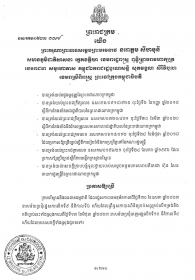
November 15
2023Circular Strategy on Environment 2023-2028
November 15, 2023The circular strategy on environment 2023-2028 is designed to turn the potential of the environmental sector into real benefits for the Cambodian nation and its people of all generations. The circular strategy is designed as a circle, with a CORE strategy in the center and three strategies on the outside. The central strategy revolves around three key angles: enhancing policy, establishing digital administration, and broadening extension. These three elements serve as the driving force propelling the other three strategies forward with vigor. The first of the three outside strategies include: being CLEAN, which has three angles: controlling pollution, modernizing pollution measurement system, and improving environmental impact assessment. The second strategy: going GREEN has three angles: intensifying tree planting movement, ensuring sustainable management of protected areas, and enhancing local communities’ livelihood. Lastly, the third strategy: being SUSTAINABLE has another three angles: applying compliance, expanding cooperation and strengthening coordination.
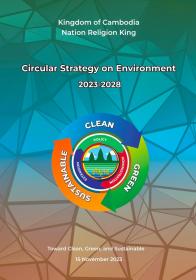
January 09
2024វិធានប្រតិបត្ដិសម្រាប់មាត្រា៦ នៃកិច្ចព្រមព្រៀងទីក្រុងប៉ារីសស្ដីពីការប្រែប្រួលអាកាសធាតុនៅកម្ពុជា
January 09, 2024មាត្រា ៦ នៃកិច្ចព្រមព្រៀងទីក្រុងប៉ារីសស្ដីពីការប្រែប្រួលអាកាសធាតុ អនុញ្ញាតឱ្យប្រទេសនានាសហការដោយស្ម័គ្រចិត្ដក្នុងការអនុវត្ដ NDC របស់ខ្លួន។ នៅក្នុងការអនុវត្ដកិច្ចសហប្រតិបត្ដិការស្ម័គ្រចិត្ដក្រោមមាត្រា ៦ សំដៅលើការធ្វើពាណិជ្ជកម្មជាអន្ដរជាតិនៃឥណទាន GHG ER រវាងប្រទេសនានា ដោយGHG ER ដែលសម្រចបាននៅក្នុងប្រទេសមួយត្រូវបានរាប់បញ្ចូលទៅក្នុងលទ្ធផលនៃគោលដៅ NDC របស់ប្រទេសមួយផ្សេងទៀតជាថ្នូរនឹងការផ្ដល់ថវិកា។ ហេតុដូចនេះហើយ វិធីសាស្ដ្រសហការក្រោមមាត្រា៦ បានផ្ដល់យន្ដការមួយតាមរយៈហិរញ្ញវត្ថុអន្ដរជាតិដល់គម្រោង GHG ER នានា ដែលប្រឈមនឹងឧបសគ្គក្នុងការអនុវត្ដ។
